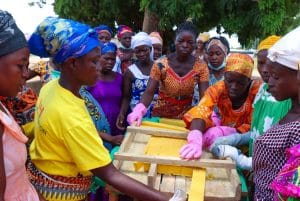The 4R Nutrient Stewardship Project (4R-NSP) has been at the forefront of advancing gender equality and women’s empowerment across various sectors. The project’s initiatives that focus on women’s leadership have led to inspiring success stories from initiatives like the Rural Commercial Women’s Groups (RCWGs), Gender Model Families (GMF), and the promoting women in decision-making positions within co–operatives. These initiatives have profoundly impacted gender norms and community development.
RCWGs have been instrumental in women pursuing financial independence and leadership. These groups have provided women with financial literacy and entrepreneurial skills, enabling them to run successful businesses and become community leaders. In Ghana and Ethiopia, refresher training sessions on leadership capabilities and organizational support have enhanced the skills of over 1,000 RCWG members. This training has strengthened their business acumen as well as their assertiveness and negotiation skills, fostering a generation of women who are role models for their peers.

Women from the 4R Rural Commercial Women Group engage in soap making, which contributes to income generation in Northern Ghana.
RCWG training has had a cascading effect in Senegal where local facilitators conducted training in regional languages for more than 500 women. This initiative addressed challenges regarding the accessibility of training materials in rural areas, enhancing the leadership skills of marginalized women and promoting their active participation in economic activities.
The GMF initiative has challenged traditional gender roles and promoted joint decision-making and shared household responsibilities. In Senegal, the inclusion of over 200 polygamous families using the GMF approach has led to a newfound awareness of the benefits of collaborative household management. This has translated into improved family nutrition, children’s health, and household income.
In Ethiopia, home-to-home visits and monthly GMF meetings facilitated discussions on gender equality, cultural norms, and productivity barriers among more than 1,200 families. These efforts resulted in men participating in traditionally female tasks and women demonstrating stronger leadership skills. Including female-headed households further underscored the openness to gender equality beyond conventional family structures.
Promoting women in leadership positions within co-operatives has seen remarkable success. Women have assumed key roles, driving forward transformative initiatives and influencing positive behavioral changes within their communities. In Ethiopia, women’s involvement in co-operatives has led to increased community engagement and heightened women’s participation in economic activities, benefiting over 1,500 women. These women are now catalysts for change, championing gender equality and inspiring others to follow suit.
Community Gender Dialogue sessions have been pivotal in raising awareness about gender inequalities and promoting inclusivity. In Senegal, these sessions addressed critical issues, such as early marriage, women’s participation in decision-making, and violence against women, involving more than 300 community members. The involvement of opinion leaders and government representatives facilitated a deeper appreciation for women’s economic contributions and their roles in family decision-making.

A Gender Model Family in the East Gonja district of Northern Ghana.
In Ethiopia and Ghana, additional dialogue sessions covered various topics, including gender roles and gender-based violence, reaching over 2,000 participants. These sessions contributed to positive behavioural changes, enhancing women’s access to family resources and joint decision-making. The dialogue sessions also played a crucial role in reducing intimate partner violence and fostering community action against rights abuses.
Gender Equality Summits highlighted the accomplishments in gender equality. In Ethiopia, the summit, “Celebrating Changemakers for Gender Equality,” showcased the experiences of GMF and RCWG members, co–operative leaders, and other stakeholders, involving more than 400 participants. Educational dramas and group discussions underscored the project’s transformative effects and sustainability.
In Ghana, the summits provided more than 500 beneficiaries with a platform to showcase their achievements in gender equity. Participants included GMF members, male gender champions, women sales agents, and co-operative members. The events culminated in commitments from various institutions to sustain and scale up the project’s achievements, ensuring long-term impact and sustainability.
The success stories of initiatives like RCWGs, GMFs, and women’s leadership within co-operatives demonstrate the transformative impact of dedicated efforts towards gender equality and women’s empowerment. The 4R Project has empowered women economically and has also fostered a cultural shift towards shared responsibilities and joint decision-making. The ripple effects of these initiatives continue to inspire and drive forward the agenda of gender equality, paving the way for more inclusive and equitable communities.